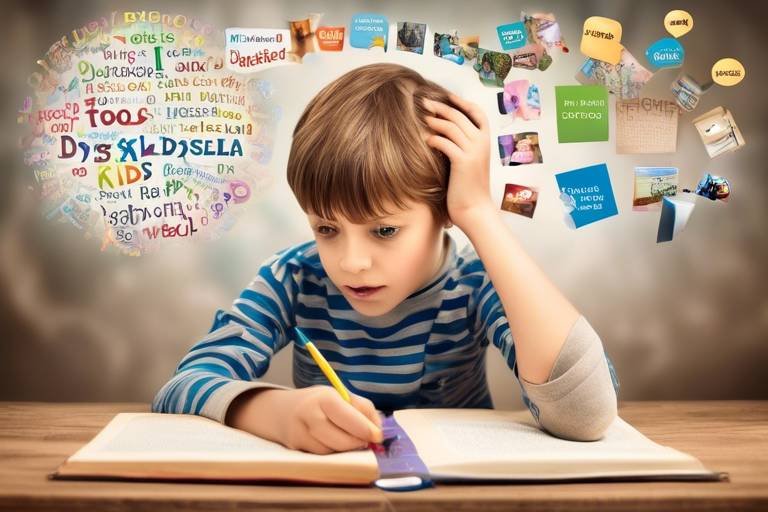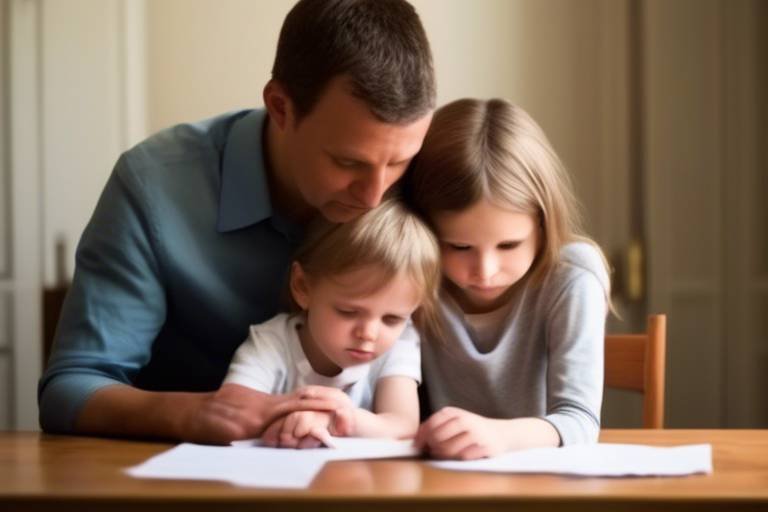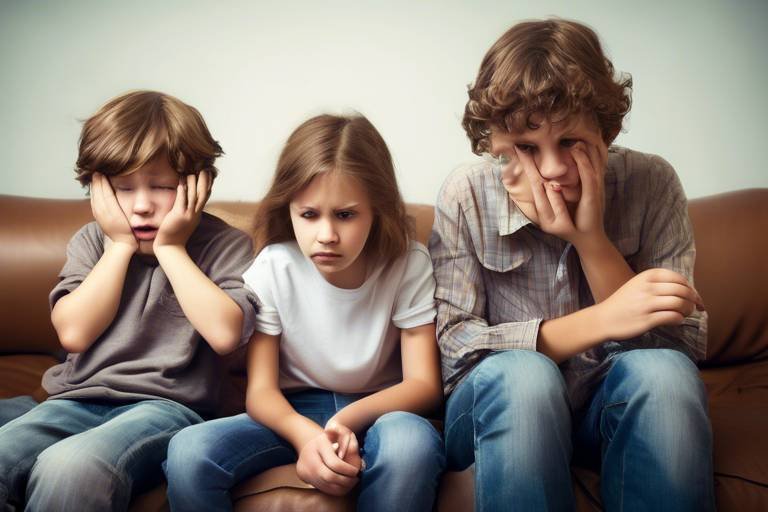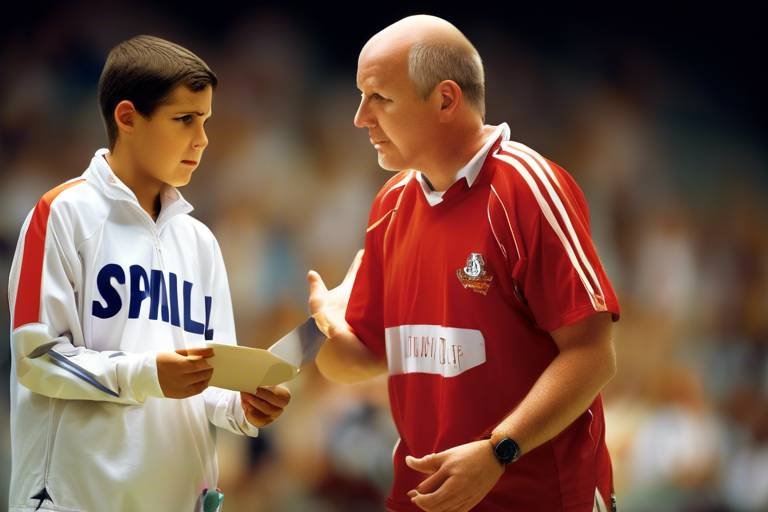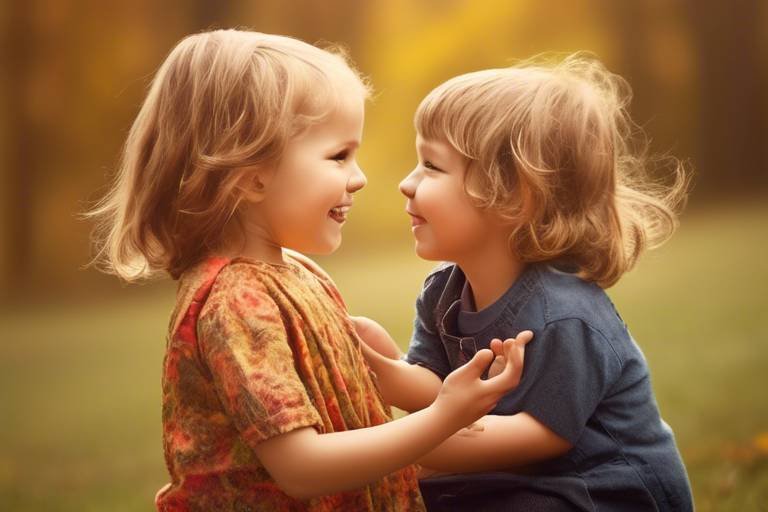The Impact of Parental Fighting on a Child’s Development
When parents engage in conflict, the ripples of that fighting can extend far beyond the immediate moment, impacting their children in profound ways. It's essential to understand that children are not mere observers; they are deeply affected by the emotional climate of their homes. The atmosphere created by parental disputes can lead to a host of emotional, psychological, and social challenges that may follow them into adulthood. Imagine a child as a delicate plant, thriving in a nurturing environment but wilting under harsh conditions. The emotional turmoil from witnessing parental fights can create a similar effect, stunting their growth and development.
At the heart of this issue is the emotional response that children develop as a result of their parents' conflicts. They may feel anxious, insecure, or even responsible for the discord, leading to a perpetual state of worry. This anxiety can manifest in various ways, affecting their daily lives, from their interactions with peers to their performance in school. The question arises: how can we mitigate these effects and foster a healthier environment for our children? Understanding the dynamics of parental fighting is the first step towards creating a more stable and supportive home.
Children exposed to parental fighting often develop heightened emotional responses, leading to anxiety and insecurity. This section examines how these emotional repercussions manifest and affect a child's daily life. The emotional fallout can be likened to a storm cloud that follows a child everywhere they go. They may feel on edge, unable to concentrate on schoolwork, or hesitant to engage with friends. The constant tension can create a cycle of fear and uncertainty, which can be incredibly debilitating for a developing mind.
Exposure to conflict can lead to significant behavioral changes in children, such as aggression or withdrawal. Children might either lash out, mirroring the aggression they witness, or they may retreat into themselves, becoming silent observers of their own lives. This part discusses the various behavioral outcomes and their implications for social interactions. It's crucial to recognize that these behaviors are not merely phases; they can have lasting effects on how children relate to others throughout their lives.
In the short term, children may exhibit increased irritability or defiance. They might act out at school or home, struggling to express their feelings in constructive ways. This subsection delves into the immediate reactions children have to witnessing parental disputes. The chaos at home can lead to outbursts in public settings, which can be embarrassing for parents and isolating for the child. It's a vicious cycle that can be hard to break.
Long-term exposure to conflict can create lasting behavioral issues. This section explores how these patterns develop and their potential impact on future relationships. Children who grow up in conflictual environments may carry these learned behaviors into adulthood, finding it challenging to maintain healthy relationships. They may struggle with trust or become overly defensive, perpetuating a cycle of conflict in their own lives.
Children from conflictual homes may struggle with peer relationships. This segment discusses how parental fighting influences social skills and friendships. The inability to trust others or communicate effectively can lead to isolation. Children may find it hard to form bonds, fearing that their friendships could mirror the instability they experience at home. They may become either overly aggressive or excessively passive, both of which can hinder their ability to connect with peers.
Parental fighting can detrimentally affect a child’s focus and motivation, leading to declining academic performance. This part analyzes the correlation between familial conflict and educational outcomes. When a child is preoccupied with the chaos at home, their ability to concentrate on studies diminishes. They may struggle with homework, miss school, or even act out in class, all of which can lead to a downward spiral in their academic achievements.
The psychological effects of parental fighting can be profound, often leading to issues such as depression or low self-esteem. This section outlines key psychological challenges faced by affected children. The emotional scars left by parental conflict can linger well into adulthood, affecting their mental health and overall well-being.
Children exposed to frequent conflict may develop anxiety disorders. This subsection investigates the link between parental fighting and increased anxiety levels in children. The constant exposure to stress can trigger a fight-or-flight response, making children more susceptible to anxiety disorders as they grow older.
Parental conflict can severely impact a child's self-esteem. This part examines how witnessing fighting influences their self-worth and identity formation. Children may internalize the conflict, believing that they are somehow to blame for their parents' disagreements, leading to a distorted self-image that can take years to heal.
Understanding the negative impact of parental fighting is crucial for intervention. This section provides strategies for parents to reduce conflict and foster a healthier environment for their children. It's vital for parents to recognize that their actions have a direct impact on their children's emotional and psychological development.
Implementing effective communication techniques can help mitigate conflict. This subsection offers practical tips for parents to improve their interactions and reduce fighting. Open dialogue, active listening, and expressing feelings without blame can create a more harmonious home environment.
In some cases, professional intervention may be necessary. This part discusses the importance of counseling and therapy for families experiencing high levels of conflict. Seeking help is not a sign of weakness; rather, it’s a proactive step towards healing and fostering a healthier family dynamic.
- How does parental fighting affect a child's mental health? - Children exposed to conflict may develop anxiety, depression, and low self-esteem.
- What can parents do to minimize conflict? - Effective communication and seeking professional help can significantly reduce conflict.
- Are the effects of parental fighting permanent? - While some effects can linger, intervention and support can lead to positive changes.

Understanding Emotional Responses
When children are exposed to parental fighting, it can feel like they are caught in a storm without an umbrella. The emotional fallout from these conflicts often manifests in heightened feelings of anxiety and insecurity. Imagine being a child, witnessing your parents argue, and feeling as if the ground beneath your feet is shifting. This uncertainty can lead to a whirlwind of emotional responses that affect their daily lives.
Children may not fully comprehend the reasons behind the arguments, but they can certainly sense the tension in the air. This confusion can lead to a range of emotional reactions, including:
- Fear: A child might fear for their safety or worry about the stability of their family.
- Sadness: Witnessing conflict can lead to feelings of sadness and loss, as the family unit they once felt secure in seems to be disintegrating.
- Anger: Children may also feel anger, not just towards their parents but also towards themselves for feeling helpless.
These emotional responses can have profound implications for a child's development. For instance, children may develop a heightened sensitivity to conflict, becoming overly reactive in situations that remind them of their parents' arguments. This can create a cycle where the child is constantly on edge, anticipating conflict in their own relationships as they grow older.
Moreover, the emotional turmoil can lead to internalized feelings, where children bottle up their emotions instead of expressing them. This internalization can result in long-term issues such as depression or social withdrawal. It’s as if they are carrying a heavy backpack filled with unresolved feelings, making it difficult for them to engage with peers or participate in activities they once enjoyed.
In essence, the emotional repercussions of parental fighting are not just fleeting moments of discomfort; they can shape a child's emotional landscape for years to come. By understanding these responses, we can begin to see the importance of fostering a peaceful home environment, not just for the sake of the parents, but for the emotional well-being of the children.
- How can I tell if my child is affected by parental conflict? Look for signs such as changes in behavior, increased anxiety, or withdrawal from social interactions.
- What can I do to minimize conflict in front of my children? Focus on effective communication techniques and try to resolve disputes privately.
- Is it ever too late to address the impact of parental fighting? It's never too late; seeking professional help can provide support for both parents and children.

Behavioral Changes in Children
When children are exposed to parental fighting, the repercussions can ripple through their behavior, manifesting in ways that can be alarming to parents and caregivers. It’s like watching a storm brew on the horizon; you know something is coming, but the impact can be unpredictable and far-reaching. Children often react to the tension in their home environment by altering their behavior, which can lead to significant changes in how they interact with others and perceive their world.
One of the most common outcomes of witnessing parental conflict is an increase in aggression. Children may begin to act out, hitting, yelling, or exhibiting other forms of disruptive behavior. This can be a direct reflection of the chaos they observe at home. They might think that aggression is an acceptable way to express their feelings or resolve conflicts, mirroring the very behaviors they see between their parents. This can create a vicious cycle, where the child’s aggressive actions lead to further conflict both at home and in social settings.
On the flip side, some children may choose to withdraw from social interactions altogether. Instead of becoming aggressive, they might become quiet and isolated, retreating into themselves as a coping mechanism. This withdrawal can stem from feelings of insecurity and fear, leading them to believe that engaging with others is risky or unsafe. They might avoid friendships or struggle to communicate effectively, leaving them feeling lonely and disconnected.
In the short term, the effects of parental fighting can be quite pronounced. Children may display increased irritability, often snapping at peers or family members over minor issues. This irritability can be likened to a pressure cooker; the more pressure builds up from the conflict they witness, the more likely they are to explode in frustration over small triggers. Additionally, defiance can become a common trait, as children test boundaries and assert control in a situation where they feel powerless.
As time goes on, the behavioral changes can solidify into long-term patterns. Children who grow up in conflictual environments may carry these behaviors into adulthood, struggling with relationships and social interactions. They might find themselves repeating the cycle of conflict in their own relationships, perpetuating a legacy of dysfunction. This is not just a phase; it’s a pathway that can lead to significant challenges in forming healthy, stable relationships in the future.
Moreover, children from homes filled with conflict often find it challenging to form peer relationships. The skills needed to navigate friendships—like empathy, communication, and conflict resolution—can be severely underdeveloped. When a child is accustomed to seeing arguments and tension, they may struggle to understand how to engage positively with friends. This can lead to social isolation, further exacerbating feelings of loneliness and low self-worth.
In conclusion, the behavioral changes that arise from parental fighting are complex and multifaceted. They can range from aggression to withdrawal, impacting not only the child’s interactions with family but also their relationships with peers and academic performance. Recognizing these changes is the first step toward addressing them, allowing parents to intervene and create a more nurturing environment.
- How can I tell if my child is affected by parental fighting? Look for changes in behavior such as increased aggression, withdrawal from social interactions, or academic struggles.
- What can I do to help my child cope with parental conflict? Open communication, providing emotional support, and seeking professional help if necessary can be beneficial.
- Can children recover from the effects of parental fighting? Yes, with the right support and interventions, children can learn to cope and develop healthier behaviors.

Short-term Behavioral Effects
When children are exposed to parental fighting, the immediate aftermath can be quite striking. They often respond with increased irritability and defiance, which can create a ripple effect in their daily lives. Imagine a child who once approached their friends with enthusiasm now becoming withdrawn or argumentative. This change is not merely a phase; it’s a reaction to the turmoil they witness at home. The emotional turbulence can manifest in various ways, leading children to feel as if they are walking on eggshells, unsure of what might trigger another outburst.
These behavioral changes can be particularly alarming for parents, as they may notice their child acting out in school or at home. For instance, a child might throw a tantrum over minor issues or refuse to follow simple instructions. This behavior stems from the stress and anxiety that comes with witnessing conflict. Children, much like sponges, absorb the chaos around them, and their reactions can be a reflection of their inner turmoil.
Moreover, the short-term effects can vary based on the child’s age and temperament. Younger children may resort to regressive behaviors, such as bedwetting or thumb-sucking, as a way to cope with their feelings of insecurity. On the other hand, older children might express their distress through aggression or social withdrawal. They may lash out at siblings or peers, not fully understanding that their actions are a byproduct of their home environment. It’s essential to recognize that these behaviors are not intentional mischief but rather a cry for help.
In a nutshell, the short-term behavioral effects of parental fighting can be categorized into several key areas:
- Irritability: Children may become easily frustrated or angered over trivial matters.
- Defiance: Increased resistance to authority figures, including parents and teachers.
- Social Withdrawal: A tendency to isolate themselves from friends and family.
- Regressive Behaviors: Younger children may revert to earlier developmental stages as a coping mechanism.
Understanding these immediate reactions is crucial for parents. Recognizing that their child’s behavior may be a direct response to the conflict can help in addressing the situation more compassionately. Instead of reacting with frustration, parents can create a safe space for their children to express their feelings, fostering open dialogues about emotions and conflicts. This approach not only aids in alleviating the child’s distress but also strengthens the parent-child bond.
- What should I do if my child exhibits aggressive behavior after witnessing parental conflict?
It’s important to address the behavior calmly. Engage your child in conversation about their feelings and reassure them that it’s okay to express emotions. Consider seeking professional help if the behavior persists. - How can I help my child cope with anxiety stemming from parental fighting?
Encourage open communication and create a supportive environment. Activities such as mindfulness exercises or art therapy can also help children express their feelings in a constructive way. - Is it normal for children to have regressive behaviors during times of conflict?
Yes, regressive behaviors are common in children exposed to stress. They may revert to earlier stages of development as a way to cope with their feelings of insecurity.

Long-term Behavioral Patterns
When children are consistently exposed to parental fighting, the effects can ripple through their lives, shaping their behavior in profound and sometimes troubling ways. Over time, these children may develop that manifest in various aspects of their lives. Imagine a tree growing in a storm; the winds may bend its branches, but the roots can become deeply entrenched in the soil, making it difficult to uproot later. Similarly, a child's early experiences with conflict can lead to entrenched behaviors that are hard to change as they grow.
One of the most common long-term effects is the tendency for these children to replicate aggressive behaviors in their own interactions. They may learn that conflict is resolved through shouting or physicality, which can lead to a cycle of aggression in their future relationships. This behavior can be likened to a vicious circle, where the child, having witnessed conflict, becomes a participant in it, perpetuating the very dynamics they once observed. In contrast, some children may retreat into themselves, developing withdrawal tendencies that hinder their ability to engage socially. They might struggle to form friendships or maintain relationships, fearing conflict or rejection.
Research indicates that children from high-conflict homes often display a range of behavioral issues as they transition into adolescence and adulthood. These can include:
- Increased Aggression: They may become more prone to anger and hostility, which can lead to conflicts with peers and authority figures.
- Social Withdrawal: Conversely, some may become overly reserved, avoiding social situations altogether due to anxiety about potential conflict.
- Difficulty in Relationships: As adults, they may struggle with intimacy and trust, often fearing that every disagreement could escalate into a major conflict.
Moreover, the impact of parental fighting can extend into other areas of life, such as academic performance and self-esteem. Children who grow up in these environments may find it challenging to concentrate on their studies, as the emotional turmoil from home distracts them. This lack of focus can lead to poor grades and a diminished sense of achievement, further complicating their behavioral patterns.
In summary, the long-term behavioral patterns resulting from parental fighting can be complex and varied. Understanding these patterns is crucial for parents and caregivers, as it highlights the importance of creating a peaceful home environment. By addressing conflicts constructively and modeling healthy behaviors, parents can help break the cycle of negativity and foster resilience in their children.

Impact on Peer Relationships
Children who grow up in an environment filled with parental conflict often face significant challenges when it comes to forming and maintaining peer relationships. Imagine a child who has witnessed their parents argue frequently; this child might approach friendships with a sense of apprehension or fear, unsure of how to navigate social interactions. They may struggle to trust others, believing that conflict is an inevitable part of any relationship. This lack of trust can make it difficult for them to forge connections with peers, leading to feelings of isolation.
Furthermore, the emotional turmoil that stems from parental fighting can manifest in various ways during social interactions. For instance, children might exhibit aggressive behaviors as a defense mechanism, believing that being tough is the only way to protect themselves from potential conflict. Alternatively, they may withdraw entirely, avoiding social situations to sidestep the possibility of conflict, mirroring what they see at home. This withdrawal can lead to a vicious cycle where the child feels more isolated and experiences heightened anxiety, further complicating their ability to connect with others.
Research indicates that children from conflictual homes often find it challenging to develop essential social skills, such as empathy and effective communication. These skills are vital for building strong friendships and navigating group dynamics. When children are not exposed to healthy conflict resolution at home, they may not learn how to express their feelings appropriately or understand the perspectives of others. Consequently, they might struggle with peer acceptance and experience difficulties in forming lasting friendships.
To illustrate this point, consider the following table that outlines the potential impacts of parental fighting on a child’s peer relationships:
| Impact | Description |
|---|---|
| Trust Issues | Difficulty in trusting peers due to learned behavior from parental conflict. |
| Aggression | Increased tendency to react aggressively in social situations. |
| Withdrawal | Avoidance of social interactions to escape potential conflicts. |
| Poor Communication Skills | Struggles with expressing feelings and understanding others. |
| Low Peer Acceptance | Challenges in forming and maintaining friendships. |
In summary, the impact of parental fighting on a child's ability to form healthy peer relationships is profound and multi-faceted. It is crucial for parents to recognize the potential long-term consequences of their conflicts, not just for themselves but for their children's social development. By fostering a more peaceful and communicative environment, parents can help their children build the social skills necessary for healthy friendships and emotional resilience.
- How can parental conflict affect a child's social skills?
Parental conflict can hinder a child's ability to develop essential social skills, as they may not learn effective communication and empathy in a conflictual environment. - What are some signs that a child is struggling with peer relationships?
Signs may include withdrawal from social situations, difficulty making friends, or displaying aggressive behavior towards peers. - Can therapy help children affected by parental conflict?
Yes, therapy can provide children with coping strategies and tools to manage their emotions, improving their social interactions.

Academic Performance
Parental fighting can have a significant ripple effect on a child's academic performance, often leading to a decline in focus and motivation. Imagine trying to concentrate on a math problem while the sounds of raised voices echo in the background; it’s nearly impossible! When children are exposed to a chaotic home environment filled with conflict, their ability to concentrate on schoolwork diminishes. This struggle can manifest in various ways, including poor grades, incomplete assignments, and a general disinterest in learning.
Research has shown that children from homes where conflicts are frequent are more likely to experience academic challenges. The emotional turmoil caused by witnessing parental disputes can lead to cognitive distractions, making it hard for kids to absorb information in class. For instance, a child who is worried about their parents’ relationship might find it difficult to focus on a teacher’s instructions, resulting in missed learning opportunities. This creates a vicious cycle where declining academic performance leads to further anxiety and stress, which can exacerbate the situation.
Moreover, the impact on academic performance is not just limited to immediate effects. Over time, children who consistently deal with parental conflict may develop a negative attitude towards education altogether. They might start to view school as a place of stress rather than a learning environment, leading to a lack of engagement and participation in class activities. This disengagement can be particularly evident during critical developmental stages, such as during transitions from elementary to middle school or high school, where academic demands increase significantly.
To illustrate the correlation between parental conflict and academic performance, consider the following table:
| Impact of Parental Conflict | Potential Academic Outcomes |
|---|---|
| Increased Anxiety | Poor concentration, lower test scores |
| Emotional Distress | Decline in homework completion, lack of participation |
| Negative Attitude Towards School | Increased absenteeism, drop in grades |
It’s also worth noting that the social dynamics within the school environment can be affected. Children who are preoccupied with family issues may find it challenging to form friendships or collaborate with peers on group projects. The social isolation that can result from this situation further complicates their academic experience, as they may lack the support systems that are critical for success in school.
In conclusion, the effects of parental fighting extend far beyond the home, infiltrating a child's academic life and overall development. It’s crucial for parents to recognize the profound impact their conflicts can have on their children and take proactive steps to create a more supportive and stable environment. By addressing conflicts constructively and prioritizing open communication, parents can help mitigate these negative effects and foster a healthier academic experience for their children.
- How does parental fighting affect a child's mental health?
Parental fighting can lead to increased anxiety, depression, and low self-esteem in children, affecting their overall mental health. - What are some signs that a child is struggling academically due to parental conflict?
Signs may include declining grades, lack of interest in school, irritability, and withdrawal from social interactions. - What can parents do to reduce conflict in front of their children?
Effective communication, conflict resolution strategies, and seeking professional help through counseling can help reduce conflict.

Psychological Implications
The psychological effects of parental fighting can be profound, often leading to issues such as depression or low self-esteem. Children who grow up in environments filled with conflict may experience a constant state of emotional turmoil, which can hinder their ability to form healthy relationships and develop a positive self-image. Imagine a child trying to navigate the chaotic waters of their home life, where love and support are often overshadowed by anger and hostility. This tumultuous atmosphere can create a breeding ground for various psychological challenges, making it crucial to understand the implications of such an upbringing.
One of the most significant psychological challenges faced by children exposed to parental fighting is the development of anxiety disorders. These children often find themselves in a state of hyper-vigilance, always on alert for the next argument or conflict. This constant state of anxiety can lead to a range of issues, such as difficulty concentrating in school, trouble sleeping, and even physical symptoms like headaches or stomachaches. The link between parental fighting and increased anxiety levels is not just a coincidence; studies have shown that children from high-conflict homes are more likely to develop anxiety disorders as they grow older.
Moreover, the impact of parental conflict on a child's self-esteem cannot be overstated. Witnessing frequent arguments can lead children to internalize the negativity around them, resulting in feelings of worthlessness or inadequacy. They may begin to believe that they are somehow responsible for the conflict or that they are unworthy of love and affection. This distorted self-view can follow them into adulthood, affecting their relationships, career choices, and overall happiness. It’s like carrying a heavy backpack filled with rocks—each rock representing a negative experience or belief that weighs down their self-worth.
As these children grow into teens and adults, the psychological scars left by parental fighting can manifest in various ways. They may struggle with intimacy in relationships, fearing that conflict will arise if they let their guard down. Alternatively, they might become overly aggressive or confrontational, having learned that fighting is a normal way to resolve issues. This cycle can perpetuate itself, creating a pattern of conflict that continues into future generations.
To illustrate the psychological implications of parental fighting, consider the following table that summarizes key effects:
| Psychological Effect | Description |
|---|---|
| Anxiety Disorders | Increased levels of anxiety, leading to difficulty in daily functioning. |
| Depression | Feelings of sadness and hopelessness stemming from a chaotic home environment. |
| Low Self-Esteem | Negative self-image and feelings of worthlessness due to parental conflict. |
| Relationship Issues | Difficulty in forming and maintaining healthy relationships as adults. |
Understanding these psychological implications is vital for parents and caregivers. By recognizing the potential harm caused by their conflicts, they can take proactive steps to minimize the negative impact on their children. This not only benefits the children but also helps create a more harmonious family environment. After all, a child’s emotional health is as important as their physical health, and addressing these issues early on can pave the way for a brighter, more stable future.
- How can parental fighting affect a child's mental health?
Parental fighting can lead to anxiety, depression, and low self-esteem in children, impacting their emotional and psychological well-being.
- What are the signs that a child is affected by parental conflict?
Signs may include increased irritability, withdrawal from social situations, changes in academic performance, and difficulty in forming relationships.
- What can parents do to minimize the impact of conflict on their children?
Implementing effective communication techniques and seeking professional help can significantly reduce conflict and its negative effects on children.

Development of Anxiety Disorders
When children are exposed to parental fighting, it can create an environment filled with tension and unpredictability. This instability often leads to heightened levels of stress and anxiety in children. Imagine living in a house where the atmosphere feels like a ticking time bomb; every argument between parents can feel like it might explode at any moment. As a result, children may develop a sense of hyper-vigilance, constantly on the lookout for signs of conflict, which can lead to chronic anxiety.
Research indicates that children who witness frequent parental disputes are at a higher risk of developing anxiety disorders. These disorders can manifest in various ways, including generalized anxiety, social anxiety, and even panic attacks. The emotional turmoil from witnessing conflicts can create a belief in children that they are powerless, leading to feelings of inadequacy and fear. The anxiety they experience is not just a fleeting feeling; it can become a persistent part of their lives, affecting their ability to engage in everyday activities.
Furthermore, the impact of parental fighting can lead to a cycle of anxiety that perpetuates itself. For instance, a child who feels anxious about their home life may struggle to socialize with peers, fearing judgment or rejection. This withdrawal can result in loneliness, which in turn exacerbates their anxiety. In essence, the home environment sets the stage for how children perceive and react to the world around them.
To illustrate the connection between parental conflict and anxiety disorders, consider the following table:
| Type of Anxiety Disorder | Symptoms | Possible Triggers |
|---|---|---|
| Generalized Anxiety Disorder | Excessive worrying, restlessness, fatigue | Frequent arguments at home |
| Social Anxiety Disorder | Fear of social situations, avoidance behavior | Witnessing conflicts affecting social interactions |
| Panic Disorder | Sudden panic attacks, heart palpitations, dizziness | Unpredictable home environment |
It's crucial for parents to recognize the signs of anxiety in their children. If a child exhibits behaviors such as excessive worry, withdrawal from social activities, or physical symptoms like stomachaches without a clear medical cause, these could be indicators of anxiety disorders stemming from exposure to parental conflict. Understanding this connection can empower parents to seek help for their children and themselves.
Ultimately, addressing the root causes of anxiety is essential. By fostering a more peaceful home environment and engaging in open, honest communication, parents can significantly reduce the likelihood of their children developing anxiety disorders. This proactive approach not only benefits the children but also contributes to a healthier family dynamic.
- How can I tell if my child is experiencing anxiety?
Look for signs such as excessive worry, changes in behavior, or physical symptoms like headaches or stomachaches. - What steps can I take to reduce conflict at home?
Implementing effective communication techniques and setting aside time for family discussions can help reduce tension. - When should I seek professional help for my child?
If your child's anxiety interferes with daily activities or relationships, it may be time to consult a mental health professional.

Self-esteem Issues
Parental conflict can have a profound impact on a child's self-esteem, often leading to feelings of worthlessness and inadequacy. Imagine a child who witnesses their parents arguing frequently; they might start to believe that their own feelings and needs are unimportant in the grand scheme of things. This perception can morph into a belief that they themselves are not deserving of love or respect. When children are exposed to a tumultuous home environment, they may internalize the chaos, leading to a distorted self-image.
Research indicates that children from conflictual homes often struggle with self-acceptance. They may question their value and abilities, which can hinder their personal and social development. For instance, a child who sees their parents fighting may think, "If my parents can't get along, maybe I'm not worth loving." This kind of thinking can create a vicious cycle where low self-esteem leads to further emotional distress, making it even harder for them to engage positively with others.
Moreover, the impact of parental fighting on self-esteem can manifest in various ways. Children might become overly critical of themselves, leading to perfectionist tendencies, or they might engage in self-sabotaging behaviors. They may also struggle to form healthy relationships, fearing rejection and abandonment. In many cases, these children may find it challenging to assert themselves or express their needs, fearing that doing so will lead to further conflict or disappointment.
To illustrate the correlation between parental conflict and self-esteem issues, consider the following table:
| Parental Conflict Behavior | Child's Self-Esteem Impact |
|---|---|
| Frequent arguments | Feelings of insecurity and worthlessness |
| Emotional withdrawal | Increased self-doubt |
| Negative criticism | Perfectionism and fear of failure |
| Lack of emotional support | Difficulty in forming relationships |
Understanding these dynamics is crucial for parents. It is essential to recognize how fighting can ripple through a child's psyche, shaping their self-worth and identity. As such, creating a peaceful and supportive home environment is not just about reducing conflict; it’s about fostering a sense of safety and love that allows children to thrive. Parents should strive to communicate openly and constructively, demonstrating healthy conflict resolution methods. By doing so, they can help their children develop a more positive self-image and the confidence needed to navigate life's challenges.
- How does parental fighting affect a child's mental health? Parental fighting can lead to increased anxiety, depression, and low self-esteem in children.
- What are some signs that a child is struggling with self-esteem issues? Signs can include withdrawal from social situations, excessive self-criticism, and difficulty in forming friendships.
- How can parents improve their child's self-esteem? Parents can improve their child's self-esteem by providing consistent emotional support, encouraging open communication, and modeling healthy conflict resolution.
- When should parents seek professional help for their child's self-esteem issues? If a child shows persistent signs of low self-esteem or mental health struggles, it may be beneficial to consult a mental health professional.

Strategies for Mitigation
Understanding the negative impact of parental fighting is crucial for intervention. It's essential for parents to recognize that their conflicts don't just affect them; they ripple through the lives of their children, shaping their emotional and psychological landscapes. So, what can be done to mitigate these effects? The first step is to cultivate an environment of effective communication. By learning to express thoughts and feelings without resorting to shouting or blame, parents can foster a more peaceful home atmosphere. This not only reduces the likelihood of conflict but also teaches children valuable communication skills that they can carry into their own relationships.
For instance, parents can practice active listening, which involves truly hearing what the other person is saying, rather than just waiting for their turn to speak. This technique can significantly reduce misunderstandings and lead to more constructive discussions. Imagine a scenario where one parent feels overwhelmed by household responsibilities. Instead of lashing out, they could calmly express their feelings, allowing the other parent to respond with empathy. This kind of interaction not only resolves conflicts more effectively but also models healthy communication for children.
Another vital strategy is setting clear boundaries. Parents should establish guidelines for acceptable behavior during disagreements. This might include agreeing to take a break if things get too heated or using a 'time-out' approach to cool down before discussing sensitive topics. By demonstrating self-control and respect, parents can show their children that conflicts can be handled maturely and without resorting to hostility.
In some cases, it may be beneficial to seek professional help. Family counseling or therapy can provide a safe space for parents to explore their conflicts with the guidance of a trained professional. This process can help uncover underlying issues that contribute to fighting and equip parents with tools to manage their disagreements more effectively. It’s like having a coach who helps you improve your game; sometimes, an outside perspective can make all the difference.
Moreover, creating a supportive environment for children is essential. Parents should engage in open dialogues with their kids about feelings and emotions. This not only helps children process what they witness but also reassures them that their feelings are valid. For example, if a child expresses fear or sadness about their parents fighting, acknowledging those feelings and discussing them can help mitigate the emotional fallout. Children need to know they are not alone in their experiences.
Lastly, parents can implement stress-reduction techniques into their daily routines. Activities such as mindfulness, meditation, or even simple breathing exercises can help parents manage their stress levels, making them less likely to engage in conflicts. When parents are calm, they set a peaceful tone for the household, which benefits everyone, especially the children. It’s like tending to a garden; when the soil is nurtured, the plants thrive.
In conclusion, the strategies for mitigating the effects of parental fighting revolve around fostering effective communication, setting boundaries, seeking professional help when necessary, supporting children emotionally, and managing stress. By taking these proactive steps, parents can create a more harmonious environment that promotes healthy emotional and psychological development for their children.
- How can I tell if my child is affected by parental fighting? Signs may include increased anxiety, behavioral changes, or difficulties in school. It's important to have open conversations with your child about their feelings.
- Is it normal for parents to fight? Yes, disagreements are a normal part of relationships. However, how conflicts are handled can significantly impact children.
- What should I do if I can't control my anger during conflicts? Seeking professional help can be beneficial. Therapists can provide strategies to manage emotions effectively.
- Can children benefit from family therapy? Absolutely! Family therapy can help improve communication and reduce conflict, benefiting everyone involved.

Effective Communication Techniques
Effective communication is the cornerstone of any healthy relationship, especially in a family setting where the dynamics can be quite complex. When parents learn to communicate effectively, they not only reduce conflict but also create a nurturing environment for their children. Imagine a household where discussions are constructive rather than combative; this scenario is not just a dream—it can be a reality! But how do we get there? Here are some techniques that can bridge the gap between parents and foster a peaceful atmosphere.
First and foremost, active listening is essential. This means truly hearing what your partner is saying without formulating a response while they speak. It’s about being present in the moment. For instance, when your spouse expresses frustration about a long day, instead of jumping in with solutions, acknowledge their feelings with a simple, “I understand that you had a tough day.” This small act can significantly reduce tension and make your partner feel valued.
Another technique is to practice “I” statements instead of “you” statements. This subtle shift in language can transform a potentially explosive conversation into a more constructive dialogue. For example, saying “I feel overwhelmed when there’s a mess in the living room” is more effective than “You never clean up after yourself.” The former expresses your feelings without placing blame, which can lead to a more productive discussion.
Additionally, setting aside dedicated time for discussions can be incredibly beneficial. Life can get hectic, and it’s easy to let important conversations slip through the cracks. By scheduling regular “check-ins,” parents can create a safe space to discuss issues without the pressure of time constraints. This could be a weekly coffee date or a quiet moment after dinner. During these times, both parents can share their thoughts and feelings openly, which helps in understanding each other’s perspectives.
Moreover, it's vital to maintain a calm demeanor during discussions. When emotions run high, it’s easy to say things that can hurt. Practicing mindfulness can help parents stay grounded. Techniques such as deep breathing or taking a moment to gather thoughts can prevent escalation. For instance, if a disagreement arises, taking a few deep breaths before responding can help in maintaining a level head, thus steering the conversation back to a productive path.
Lastly, don’t underestimate the power of non-verbal communication. Body language, eye contact, and tone can convey just as much as words. Positive body language, such as leaning in and maintaining eye contact, can demonstrate that you are engaged and care about what your partner is saying. Conversely, crossing your arms or avoiding eye contact can signal disinterest or defensiveness, which may escalate tensions.
By incorporating these techniques into daily interactions, parents can significantly reduce conflict and foster a more harmonious environment for their children. Remember, it’s not just about resolving disputes; it’s about modeling healthy communication for the next generation. Children learn by observing, and when they see their parents handle disagreements with respect and understanding, they are more likely to emulate these behaviors in their own lives.
- What are "I" statements? "I" statements are a way of expressing feelings without blaming the other person. They typically start with "I feel" followed by the emotion and the reason.
- How can mindfulness help in communication? Mindfulness helps in staying present and calm during discussions, reducing the likelihood of emotional escalation.
- Why is active listening important? Active listening ensures that both parties feel heard and understood, which can lead to more constructive conversations.
- What should I do if a conversation gets heated? If tensions rise, it's best to take a break and revisit the conversation once both parties have calmed down.

Seeking Professional Help
When the atmosphere at home feels like a battlefield, it's essential to recognize that seeking professional help is not a sign of weakness, but rather a courageous step towards healing. Many families find themselves overwhelmed by conflict, and in such cases, the guidance of a trained therapist can make a world of difference. Think of it this way: just as we wouldn't hesitate to take a car to a mechanic when it's making strange noises, we shouldn't ignore the emotional turmoil brewing in our homes.
Therapists can provide a safe space for both parents and children to express their feelings and concerns. This environment fosters open communication, which is often stifled during conflicts. A skilled therapist can help families identify the root causes of their disputes and work on effective strategies to resolve them. They can also equip parents with tools to manage their disagreements in a healthier manner, ultimately reducing the negative impact on their children.
Moreover, engaging in family therapy can help children feel heard and validated. They often carry the weight of parental conflict silently, believing they must choose sides or that the fighting is their fault. Addressing these feelings in a therapeutic setting can alleviate anxiety and foster a sense of security. The therapist acts as a neutral party, guiding discussions and ensuring that each family member's voice is acknowledged.
In addition to traditional therapy, there are various forms of support available, including:
- Individual Therapy: This allows parents and children to explore their feelings separately, providing personal coping strategies.
- Family Therapy: Focused on improving communication and resolving conflicts as a unit.
- Support Groups: Connecting with other families facing similar challenges can provide comfort and shared experiences.
Ultimately, the goal of seeking professional help is to create a more harmonious home environment. It’s about breaking the cycle of conflict and fostering a nurturing atmosphere where children can thrive emotionally and socially. Remember, addressing issues early on can prevent more serious problems down the line, setting the stage for healthier relationships in the future.
- How do I know if my family needs professional help? If conflicts are frequent, intense, or leave family members feeling hurt or anxious, it may be time to seek help.
- What can I expect from family therapy? Family therapy typically involves sessions with a therapist who guides discussions, helps identify issues, and teaches conflict resolution strategies.
- Is therapy effective for children? Yes, therapy can be highly effective for children, helping them process their emotions and improve their coping skills.
Frequently Asked Questions
- How does parental fighting affect a child's emotional development?
Parental fighting can lead to increased anxiety and insecurity in children. When kids witness conflict, they often struggle with their emotions, feeling a range of heightened responses that can disrupt their daily lives and relationships.
- What are some short-term behavioral effects of witnessing parental conflict?
In the short term, children may become more irritable or defiant. They might act out as a way to express their confusion or frustration about the conflicts they observe, which can lead to difficulties in their interactions with peers and adults.
- Can parental fighting have long-term effects on a child's behavior?
Absolutely! Long-term exposure to parental conflict can create persistent behavioral issues, such as ongoing aggression or withdrawal. These patterns can significantly affect future relationships and social interactions, making it essential to address the underlying conflicts.
- How does conflict at home impact a child's academic performance?
Parental fighting can distract children, leading to decreased focus and motivation in school. This often results in declining academic performance, as the emotional turmoil makes it difficult for them to concentrate on their studies.
- What psychological issues can arise from parental fighting?
Children exposed to frequent conflict may face severe psychological challenges, including anxiety disorders and low self-esteem. The constant tension can shape their self-worth and identity, leading to long-lasting effects on their mental health.
- What strategies can parents use to mitigate the impact of their conflicts on their children?
Effective communication techniques are crucial for reducing conflict. Parents can also seek professional help, such as counseling or therapy, to address their issues constructively and create a healthier environment for their children.




